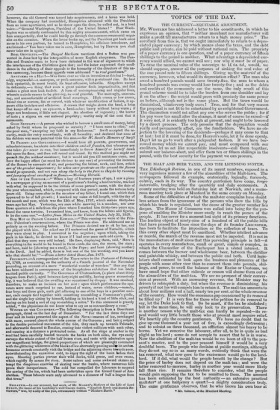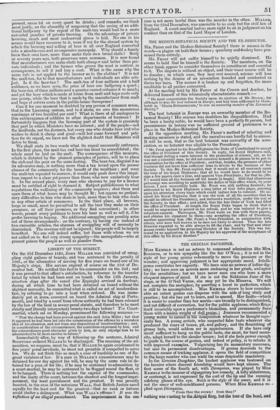THE MALT AND BEER TAXES, AND THE LICENSING SYSTEM.
THE Edinburgh Review, in one of its recent numbers, exposed in a very ingenious manner a few of the absurdities of the Malt-laws. The newspapers followed its example, oratorically, logically, furiously, calmly, each in its way. The country gentlemen have come, longo intervallo, trudging after the quarterly and daily economists. A county meeting was held on.Saturday last at Norwich, and a nume- rous meeting took place at Munford in the same county on Monday. Some of the difficulties of which the maltster complains have doubt less arisen from the ignorance of the persons who drew the bills by which his trade is regulated, but the cause of the greater number lies deeper. The House of Commons was called into being for the pur- pose of enabling the Minister more easily to reach the purses of the people. It has never for a moment lost sight of its primary functions. The leading object of ninety-nine of a hundred of all the public bills that have passed the House since the days of its founder LEICESTER, has been to facilitate the imposition or the collection of taxes. To this every other object must be sacrificed. Whether intellect advance or recede, the march of the revenue must not be impeded. It is not in the manufacture of malt alone that this pervading principle is felt—it operates in every manufacture, small or great, simple or complex, in which the Chancellor of the Exchequer has a vested interest. It comes between the brewer and wholesome beer, between the distiller and palatable whisky, and between the public and both. Until legis- lators shall consent to look upon the business and pleasures of the people with some other view than to convert them into pounds, shil- lings, and pence, to swell the balance of the Excise or Customs, we have small hope that either ridicule or reason will shame them out of the absurdities of the malt-tax. We see no prospect of their conver- sion at present. With an increasing revenue, the Minister may be driven to relinquish a duty, but when the revenue is diminishing, his poverty if not his will compels him to retain it. The malt-tax amounts to about 'four millions and a half, nearly ten per cent. of the whole revenue of the country. How would the enormous gap occasioned by its removal be filled up ? It is very fine for those who petition for its removal to say, let the Duke look to that. So he must, if the tax be abolished ; but in the mean time, he will only look to its preservation. There is another season why the malt-tax can hardly be repealed—its re- peal would very little benefit those who at present most require relief. We heartily pity the country gentlemen. We have no doubt that to give up one thousand a year out of five, is exceedingly distressing; and to subsist on three thousand, an affliction almost too heavy to be borne. Yet we conceive the labourer, after all, to be in quite as bad plight as his lord ; some do not scruple to assert that he is in worse. Now the abolition of the malt-tax would be no boon at all to the pea- sant's master, and to the poor peasant himself it would be a very doubtful boon. The people who declaim at public meetings, although they do not say so in as many words, evidently think that were the tax removed, what now goes to the exciseman would go to the 'land- lord. If it did, what would the people benefit by the change? But the price of barley does not depend on the malt-tax ; and were the latter removed to-morrow, barley in another year would more likely fall than rise. It remains therefore to consider, what the people would gain supposing the tax to be remitted to them. The amount has been estimated by the best authority an extensive practical monster* at one halfpenny a quart !—a mighty consideration truly. The same gentleman observes, that he who brews his own beer at
*Mr. Salmon, at the Illunford Meeting.
present, saves 2d. on every quart he drinks ; and remarks, we think most justly, on the absurdity of supposing that the saving of an addi- tional halfpenny by the repeal of the malt-tax would lead to a more extended practice of private brewing. On the advantage of private brewing, much and most undeserved stress is laid. No one in his senses would have recourse to it, were if not for the absurd system by which the brewing and selling of beer is all over England converted into a mischievous and an expensive monopoly. Why should a family brew their own beer, more than make their own broad cloth? Sixty or seventy years ago, both processes were common. It is now found that manufacturers can make cloth both cheaper and better than pri- vate individuals ; and the 'farmer who grows the wool is content, in consequence, to sell it and buy a coat. What is the cause why the same rule is not applied to the brewer as to the clothier ? It is not the malt-tax, for to that manufacturers and individuals are alike sub- ject. Is it the beer-tax ? The malt-tax of four millions and a half enhances, as we have seen, the price of beer one halfpenny a quart ; the beer-tax of three millions and a quarter cannot enhance it so much; and yet the beer which is made at home from malt and hops costs only one penny, while the beer that is made by the manufacturer from malt and hops et ceteris costs in the public-house threepence ! Can it for one moment be doubted by any person of common sense, that to the Licensing system, and to it alone, we owe this monstrous surcharge of two hundred per cent ? What is there at all analogous to this extravagance of addition in other departments of business? It fortunately happens that the licensing part of the system is precisely that part in which Ministers have no interest; and if the people—not the landlords, not the farmers, but every one who drinks beer and who wishes to drink it cheap and good—will but come forward and peti- tion for its repeal, we have not the slightest doubt that Ministers will listen to them.
We shall state in two words what its repeal necessarily embraces. In the first place, the malt-tax and beer-tax must be consolidated ; the whole must be laid on the malt. The consequence of this measure, which is dictated by the plainest principles of justice, will be to place the rich and the poor on the same footing. The beer-tax, disguise it as its advocates may, is nothing more than a tax levied upon the poorer classes of the community for the benefit of the wealthier ; and were the malt-tax repealed to-morrow, it would only push down this iniqui- tous impost to a class yet poorer than those who now exclusively bear it. In the second place, every man who chooses to pay for a licence must he entitled of right to demand it. Subject publichouses to what regulations the wellbeing of the community requires ; shut them and open them at what hours may be thought fit ; but oppose no prelimi- nary difficulties to him who deals in beer, more than to hint who deals in any other article of commerce. In the third place, all brewers, large or small, must be permitted to sell the beer they make on their premises, or off their- premises, as they find convenient; in other words, permit every publican to brew his beer as well as sell it, if he prefer brewing to buying. No additional smuggling. can possibly arise out of these arrangements : on the contrary, by having one instead of two excisable articles, the chances of smuggling will of necessity be diminished. The revenue will not be injured; the people will be largely benefited. No one will indeed suffer, but those with whom we are not called on to feel very strong sympathy—the monopolists—who at present poison the people as well as plunder them.



















 Previous page
Previous page